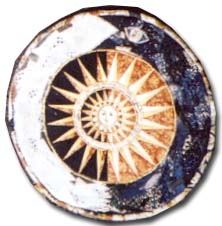swimming in a sea of cotton...plants
The new grasshopper apprentice reneged on his deal to accompany Efrat to her field site and it was up to me to fill the gap. Saw the dawn, after such a long time- I'm almost nocturnal by now. First time this summer that I was actually waiting for the sun to rise so it could heat me up- because the cotton crop was just soaked with the irrigation water and every step through the abstract jungle drenched me more. Efrat claimed the crop wasn't so high the last week, but I find it hard to believe they grow so fast; the plants were as high as my head. It's quite pretty and all, when you look at it from a vantage point, and you can see occasional spouts of water pipes, looking all the world like land whales about to surface from the endless green. Walking along the rows to the traps is fine, but when you have to cut across the rows, it's not so simple. Cotton is not like wheat, which bends easily to let you pass, cotton demands a password before grudgingly moving out of the way. I was irresistably reminded of the time I spent studying Lantana in the forests of South India. Lantana is a vile plant, evil incarnate, a weed that has not only established itself in almost all the remaining forest areas in India, but also is a driving force of ecosystem change. It was brought to India by the British, in their infinite wisdom, in order to grow it as an ornamental plant. Its flowers are quite pretty, if you like that sort of thing. So then naturally it escaped into the wild and now its everywhere. It's found in Israel as well, but people here were amused when I recoiled in horror on seeing it. Here it looks tame enough, lacking the thorns and the aggressive nature of the Indian version, but you can never tell. Anyway, my job involved estimating the impact of Lantana on the forset, and it basically meant trying to hack through dense thorny undergrowth trying to follow a path through the forest. Many days have passed since I had to struggle through bush, and now the brief walk foray in to the cotton reminded me of all that. In the middle of the cotton field, when you can no longer make out the rows or the direction, and if it wasn't for the sun you would spend frantic minutes trying to figure out where you came from and you're totally dependent on your native guide for direction, in my case Efrat, who's worked in these field for around two years, enough time to recognize every bump in the landscape.




<< Home